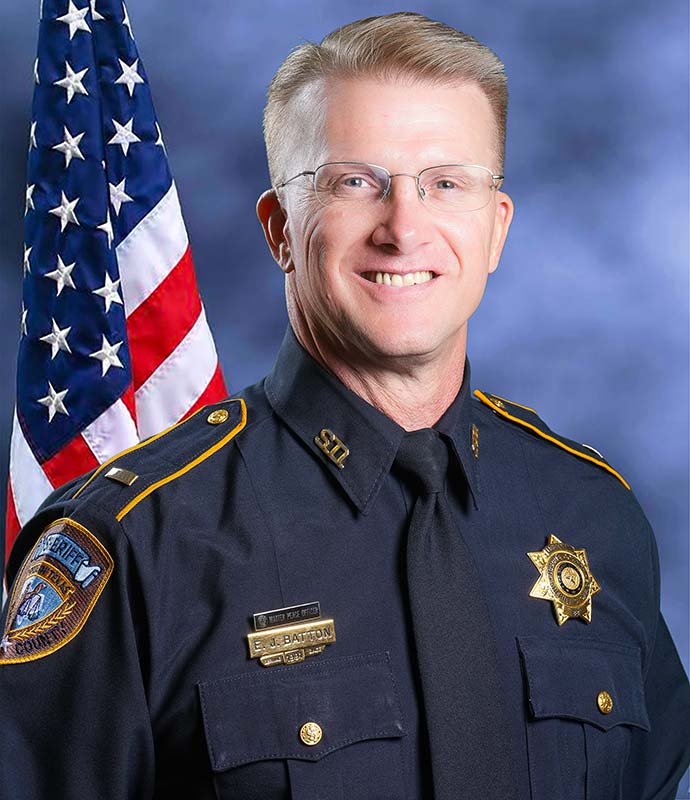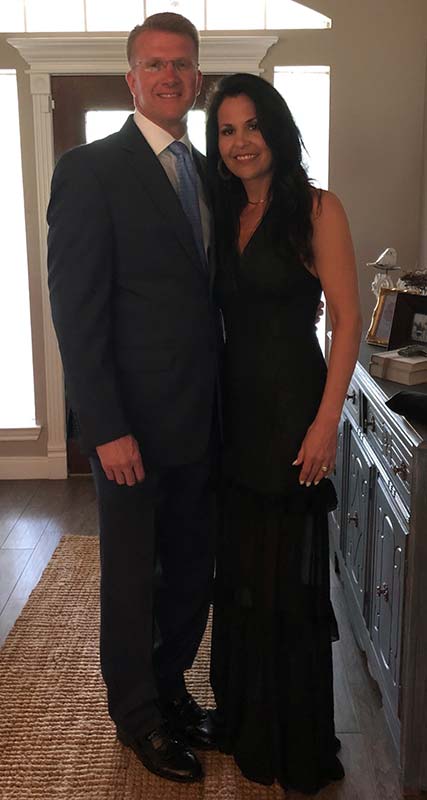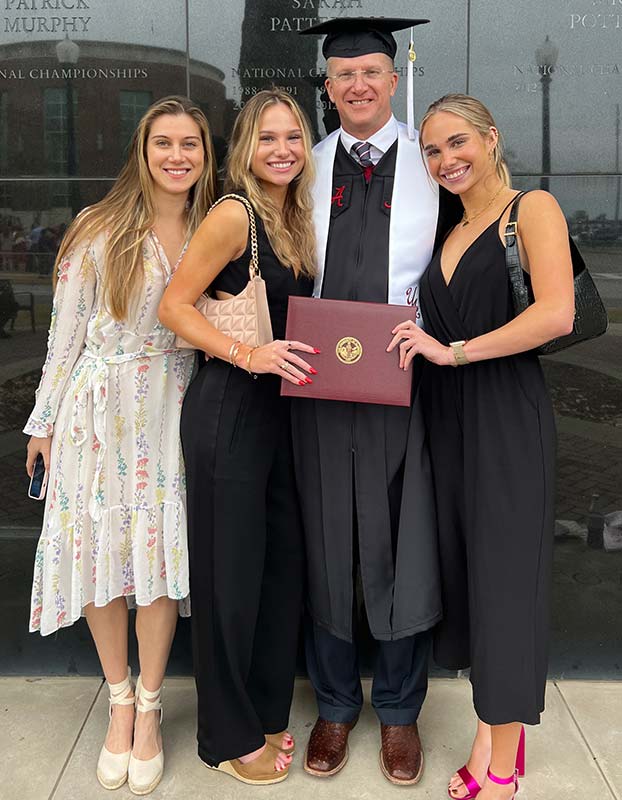Tell us about your education and career history.

My education began when I graduated high school in 1988. At the time, I was more focused on playing football than getting an education — because, let’s be honest, 18-year-old boys shouldn't be thinking for themselves. After an injury, I decided I didn't want to just stay in school at the expense of my parents, as they had their own financial concerns during the ’80s. So, to make my own money and alleviate that financial responsibility from them, I went to work for the sheriff's office in Houston, Texas, and I've been there for 31 years.
I realized along the way that, at some point, I needed to go back to school. I finally committed to getting my bachelor’s degree in 2012, and compared to other universities, I knew The University of Alabama was the best choice for me as an adult student.
My academic journey has been a lot longer than I anticipated, but I was able to take this innovative approach to get my degree because of what they offer through New College LifeTrack. I was originally on target to finish in 2016 — but life happens for all of us adults. Life is always going to happen. Life happens to everyone. But when you’re an adult, it happens at a different level.
I’m now at the end of the road, and I am grateful for everything I’ve experienced here at The University of Alabama and for my family’s instrumental support. I finally got my degree, and graduating this year has been a highlight.
What was your initial reason to go back to school?
I wanted to expand my career. In most professions, education helps you take yourself to the next level to become a better leader. The experiences you gain in college are just part of what you’ll have in a professional environment, but those experiences offer valuable tools to have under your belt. I went back because I wanted to be a more effective leader and supervisor. I went back to improve myself and, at the same time, to be an inspiration to other people and my kids so they can understand the importance of a college degree. I didn’t devote much time to my education when I was younger, but that’s OK because sometimes, when you’re an adult student, you put more into it, and you get a whole lot more out of it too.
What were some specific classes or professors that helped you throughout your time here?
All my professors, such as Dr. Dougherty, Dr. Thompson and Professor Yessick, were outstanding. Professor Yessick taught one of the last research methods classes I took, and she took such a granular approach to how you write — it literally changed how I will read or write anything for the rest of my life.
I honestly haven’t had one professor here that I didn’t truly enjoy. They were always helpful and attentive to what you needed, because they got it. They understood what I was going through as an adult student with personal and professional responsibilities.

Can you tell me about your senior project?
My senior project involves developing excellence in law enforcement leadership. I firmly believe that many agencies currently rely too much on assessment centers to address what can be internal. If we’re trying to develop leaders, we need to teach them what we want them to know because every agency has its own nuances and way of doing things — their operational objectives. So, it is more effective to identify what you want to teach your leaders and supervisors and develop classes that cover specific policies and principles that you expect them to adopt within your organizations.
I created a framework by researching what other agencies are doing in their processes of promoting personnel and found a variety of practices, such as completing oral boards or simply reading books prior to testing. My framework of prerequisite leadership courses helps individuals be more successful during official testing, make an investment in agency goals and develop the core principles and beliefs of being an effective leader. You learn a lot from good leaders, but you also learn a lot from bad leaders — what not to do and what you would do differently. But we need to focus more on what we want people to learn from the good leaders and start eliminating those bad leaders. The only way you do that is by building a base through an educational process that teaches them the foundation of what they need to know to be a better leader.
Why did you choose New College LifeTrack?
I chose New College LifeTrack because of its adaptability and flexibility. Going back to school as an adult comes with many other obligations, like meetings and a family. With everything life throws at you, the flexibility of this program allows me to tackle it online from my own living room. There are also seminars that enable you to come to campus, which I always loved because it gave you the real brick-and-mortar experience. But at the end of the day, I didn’t always have the time to go to class in-person. New College LifeTrack gives you the information, tells you what you need to be successful and supports you to push forward and learn on your own time without commuting.

And you took a campus seminar. Can you tell me about that experience?
That was a great experience. There were two different times I had to come to the campus that semester, and it was with Dr. Thompson. We came here and collaborated with all our classmates. It was a lot of fun to sit down with other adults in the class because they were all professionals, and we learned a lot about each other because we were from different industries.
I enjoyed hearing their stories that were so similar to mine, and just like everyone else, you realize the commonalities that you have had in your educational journey. These professionals also put college aside because they advanced in their careers but knew they were missing that one last component of having the degree. It was a great experience to be around people like that.
How will New College LifeTrack help you in your career and your personal life?
Well, in my career, I haven’t reached a zenith by any stretch of the imagination. And while getting a degree often helps financially, for me it was about finishing. It was a personal goal. It was a goal to show myself that, yes, I started this years ago, but it was time to finish, and I knew I could. I also wanted to inspire my children. I always stressed the importance of their education, and I want my daughters, all of them, to understand that to be reliant upon yourself and stand on your own two legs — that confidence in self lies in knowing that you can accomplish an objective. There is value in what earning a degree says about you and your capabilities. And if you are willing to put in the work, there is so much knowledge to gain. One thing I’ve realized about college and life in general — we are never done learning.
What are you most proud of in your career and education?
There are many things I’m proud of in my career. I’ve built some great relationships. I’ve learned a lot about other people in my professional career, but I’ve also gotten to know people in my academic career. I am a proud member of the UA community, and I am proud of the opportunities my family and friends have subsequently taken to come here and be a part of the University, too. I’m also very proud that my daughters can see me do this because it’s one thing for them to see a degree sitting on the wall, but they were part of this journey too. They got to see me put in the hard work, from writing papers to hours of studying sitting at my desk, and I’m proud they were able to see that side of me — my commitment and what it takes to finish something like this.
What advice would you give to a prospective student?
You’re going to get out of this what you put into it. I would encourage you to start this program. You’re not going to regret this opportunity in front of you, and you have to understand that life is going to happen. Life will always get in the way, no matter what you do. But persevere, persist and keep moving forward. Keep moving forward until you get it done because the gratification you will feel toward yourself is invaluable. I was very proud. And I was proud my kids got to see me finish. And that is something you have internally that no one can take from you.